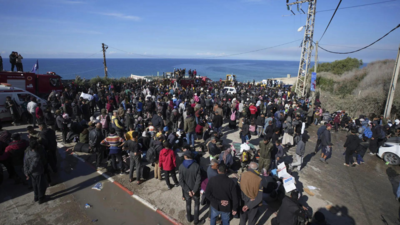After seven months in an Israeli prison, 23-year-old Palestinian student Amal Shujayyeh has finally walked free.
In the quiet night hours of January 20, in Beitunia, in the occupied West Bank, a bus dropped her off into the embrace of friends and family who had anxiously awaited her return.
“The joy is indescribable,” Shujayyeh told DW, surrounded by her family at home in Deir Jarir. “We thank God.”
Shujayyeh’s release was part of a ceasefire deal between Israel and Hamas aimed at pausing the war that has devastated Gaza for more than 15 months.
As part of the agreement, nearly 2,000 Palestinian prisoners are to be released. The deal seeks to halt the fighting for six weeks, secure the release of 33 hostages from Gaza and increase the flow of fuel and aid into the territory. Among the Palestinian prisoners to be freed are those detained for actions such as throwing stones or Molotov cocktails, alongside others convicted of killing Israelis.
Shujayyeh was in her final year studying journalism at Birzeit University near Ramallah when Israeli forces arrested her on charges of inciting violence. She said, however, that her activism was strictly within university guidelines.
“Essentially, the occupation was opposed to student activism on campus,” she said. “Even though this student activism is officially licensed and approved by the university administration.”
Life in Israeli prison one of ‘deep oppression and humiliation’
Shujayyeh vividly recalled the day of her arrest. “When we arrived at the detention center, the forced naked searches for female prisoners began,” she said. “It’s a degrading and deeply unpleasant experience that all Palestinian women endure when entering any detention center.”
These searches were carried out daily, often late at night, she said, along with the confiscation of clothes, personal belongings and even basic items like dishes and pots. “We were deprived of basic necessities, even things for comfort like hairbrushes, which they deemed ‘luxuries.’ Books and novels were also confiscated.”
Shujayyeh’s family was barred from visiting her during her incarceration. “We would see our families for just a few seconds during electronic court sessions,” she said. “If I tried to signal to them to reassure them that I was in good health, the soldier would cut off the connection. It was a feeling of deep oppression and humiliation.”
Shujayyeh’s ordeal is a common story in Palestinian society, where most families in Gaza, the occupied West Bank and east Jerusalem have had one or more members incarcerated in an Israeli prison. The impact often spans generations, leaving families without breadwinners and forcing children to grow up without one or, in many cases, both parents for years.
Many Palestinian prisoners are never told why they were detained. Israel’s “administrative detention” policy allows the state to jail individuals based on secret evidence, without filing formal charges or holding a trial.
Since the war began in October 2023, the number of detainees from Gaza, the occupied West Bank and east Jerusalem has doubled, exceeding 10,000, according to the Israeli legal organization Hamoked.
Fear of arrest remains for released Palestinians
Now reunited, Shujayyeh and her family are treasuring simple moments together. Yet, for her and other released prisoners, freedom remains fragile. There’s a looming uncertainty about the possibility of future detention — a common reality in her community.
Under the terms of the ceasefire, Palestinian prisoners released by Israel cannot be re-arrested on the same charges or returned to jail to finish serving time for past offenses, according to news agency The Associated Press. Prisoners are not required to sign any document upon their release. However, advocacy group Addameer warns that re-arrest remains a serious risk.
“All detainees released to the West Bank or east Jerusalem need to continuously show up for court appointments,” said Jenna Abuhasna, an international advocacy officer for human rights group Addameer.
“It’s very possible that the detainee could be easily targeted and faced with re-arrest. We’ve seen this happen repeatedly in previous exchange deals, including the November 2023 agreement,” she told DW.
Shujayyeh’s next court date is on February 3. But for now, she’s focused on settling back into her old life. She also hopes to resume her podcast, which she started during university.
“Being arrested will not stop us from delivering our message or sharing our cause with the world,” she said. “But we will be more cautious in how we do so.”
At home, she sits at her desk, scrolling through podcast ideas. Shujayyeh’s ultimate goal is to complete her degree and become a journalist, determined to keep telling the stories of Palestinians like herself.



































